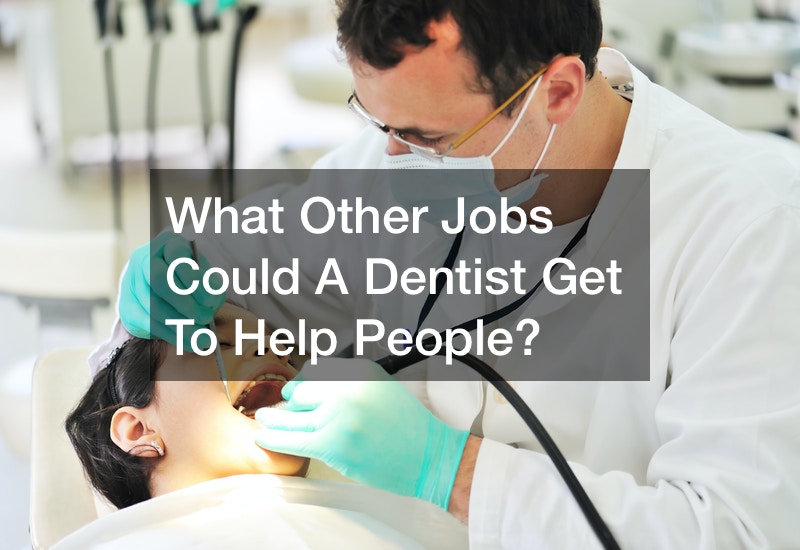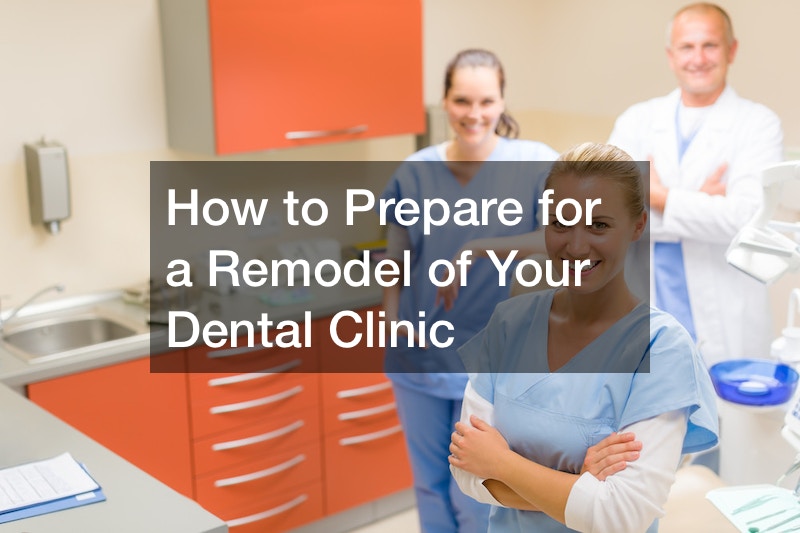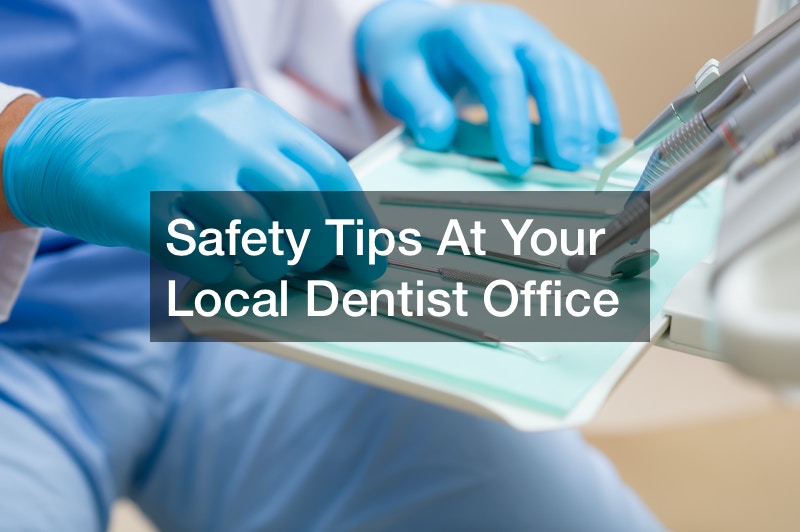
Although a dentist’s job may seem to be restricted to performing simple tasks such as giving people braces, dental bridge, and pulling teeth, they can do much more. If you’re considering becoming a dentist, this article should give you an idea of how many other career options are available for someone with dental training. Here are jobs a dentist could get to help people.
Dental Consultant

Dental consultants are sometimes dentists or dental hygienists who have chosen to work in the field of consulting. They are often consulted on some of the most challenging cases, including issues requiring special training if a general dentist was treating them. Dental consultants are more likely to be brought in when their expertise in a particular field is needed. This could include anything from working with patients who need orthodontic treatment to help to design and create a dental prosthetic.
Dental consultants are often called when the dentist is stumped or needs assistance in solving complex cases that they may not have much experience dealing with. This requires specialization in restorative work, cataract surgery, endodontics, and implants. If you were to become a dental consultant, you would likely need training in the above specialties. They should also be able to communicate well with their dentist because consulting is often about talking through your ideas and plans with the dentist to get opinions on how best to treat each patient’s case. A dental consultant can work anywhere in the world where dentists need consulting help. This means that it could be an excellent job for someone who wants to travel while still working. Some consultants choose to keep their consulting a part-time job, while others do it full-time.
Dental Lab Technician

A dental lab technician is undoubtedly a job that a dentist could do to help people. A dental lab technician, also known as an artificial teeth technician, prepares and makes all the parts of dentures and other devices made from natural or artificial materials used by a dentist for a patient. They use all kinds of materials like plastic, metal, porcelain, or synthetic resin to prepare. The dentist will provide the dental lab technician with an impression (mold) of the patient’s teeth and other devices to be used by them after taking their measurements and putting a few markings on them.
This mold is known as a study cast. After getting the study cast, the dental lab technician will start making a denture or any other device after studying it carefully to give it the exact shape and dimensions of the patient’s teeth. They use sophisticated equipment and machines to give the dentures or devices their exact shape. They are also responsible for making any adjustments if needed after attaching them to the patient’s teeth. Dental lab technicians do all work related to dental prosthetics under the supervision of a dentist, but they can’t diagnose or treat patients. The selection process of a dental lab technician is difficult, but nowadays, many colleges provide education in this field.
Dental Hygienist Instructor

Dental hygienist instructors are responsible for teaching students registered within their program to diagnose, treat, and prevent oral diseases. They also show students how to maintain good dental hygiene to keep their teeth healthy. Some dental hygienist instructors have earned bachelor’s degrees in dental hygiene, while others have earned master’s degrees. Most states require a minimum of three years of work experience as a registered dental hygienist to earn the title of instructor.
Dental hygienists must also pass state board examinations before teaching students. Dental hygienist instructors usually work normal business hours; however, some work more than 40 hours per week. Some of these instructors may be expected to conduct research and offer Medicaid planning assistance in most institutions. Most dental hygienist instructors work for community colleges and technical institutes. Other dental hygienist instructors may work at universities and private institutions.
Dentists can get a rewarding career in the dental hygiene field by becoming Dental hygienist instructors. They can earn a good income and enjoy a great life by becoming dental hygienist instructors. And they can help people to keep their teeth healthy Dental hygienist instructors work in a variety of locations. Some instructors may be full-time employees for a particular college or university, while others may hold part-time jobs at several institutions. The majority of dental hygienist instructors are employed full-time. Like any other job, the hours may vary depending on where one works and how many classes they teach during the day.
Dental Product Development

A professionally run dental office has only one goal as a business – to satisfy patients. And for this to happen, a full range of dental products must be available. Working in the product development sector can offer dentists ample opportunity to meet the needs of their patients by developing new products and proposing better Medicare plans. Dentistry is a profession that requires thorough knowledge of biology, chemistry, and biochemistry.
For this reason, it would be only logical to assume that dental product development would need special abilities and skills which are not open to everyone. However, it is not so! The main required abilities and skills are knowledge of dental product development, close cooperation with the production companies, and an ability to work in a group of professionals offering a variety of services like vision therapy services and treatment of venous disease. However, when designing new tools or instruments for dental treatment, it is essential to understand that the patient’s requirements should be met and that the design must be practical and convenient for use by both patients and professionals.
In most cases, a team of two or three people is enough to create a new design. The team must consist of members with different functions and knowledge to ensure smooth coordination and effective product development. This field of activity is both challenging and interesting because it requires study of the patient’s needs and effective communication with patients to consider their wishes, desires, and goals.
Dental Education and Research
One of the careers that a dentist could help people is dental education and research. This kind of work does not involve dealing with patients. Still, it will benefit many individuals by educating them about their teeth and advising them on primary care for their oral health. By providing an education system concerning tooth care, individuals will receive treatment that they can use to avoid future problems. Dental education and research involves many different tasks, including but not limited to: observing people’s teeth under microscopes, studying old dental records, writing up reports about the results of these observations, communicating with other dentists throughout the world to expand on new ideas, and teaching new dentists in a classroom setting.
A dentist’s salaries for this kind of work differ worldwide, depending on where they live and what type of administration position they have. However, the average salary range for dental education and research is $75,000 to $100,000 per year. Some dentists even earn over $100,000 per year by working in this field. Though there are many different occupations that a dentist could have, dental education and research are one of the most profitable careers for those who work in this field. There are many benefits to working as a dentist doing this kind of work because it allows them to expand their knowledge about teeth and teach people how to take care of their mouths properly.
Dental Insurance
A qualified dentist can make a big difference in the world by working for a dental insurance company. A dentist can be paid very well for helping people get the proper treatment they need. Also, they can offer legal help for people seeking compensation from their dental insurer. A dentist can work half-time or more at a dental insurance company to help people get dental care. They can work fewer hours, get paid more for their time, and still benefit the dentistry community by helping small-business owners offer better plans to employees.
For those who like the corporate structure and teamwork, dental insurance companies usually use teams of dentists and assistants and a group of marketing and sales professionals to create great experiences for people all over the country. Dental insurance companies pay the dentist an excellent salary while also taking care of marketing, sales, and other administrative costs. It is not uncommon for a dental insurance company to offer a wide range of benefits, including fully paid tuition to go back to school, free visits to the chiropractors office, membership at health clubs, profit-sharing bonus plans, and much more. Dental insurance is always in demand, whether private or public dental insurance. Therefore, a dentist can work for a dental insurance company and help people get the proper treatment to prevent cavities, tooth pain, and other dental problems. A qualified dentist can make a big difference in the world by working for a dental insurance company.
Public Health
By working in the public health sector, dentists can help improve the health and wellbeing of people in a significant way. A dentist can be an essential instrument as a public health worker in the fight against tooth decay and gum disease. These dental diseases are often caused by poverty, which leads to inadequate diets and an inability to access regular dental care. As a public health worker, a dentist can help ensure that people reduce their risk of severe oral health problems and other medical conditions such as heart disease and respiratory illnesses.
Public health dentistry focuses on promoting, preventing, and protecting the population’s oral health. It involves planning, designing, managing, and evaluating systems to deliver effective dental care. This dentist’s work includes everything from treating gum disease to creating water fluoridation plans. A public health dentist may also conduct research that improves oral health and use data to improve the dental care system.
A dental hygienist, a dentist, or an assistant specializing in public health can help plan and implement community programs that target children to help prevent tooth decay. A public health dentist can work with schools, daycares, and community centers to improve people’s access to oral disease prevention services. Dental sealants are one option for preventing tooth decay that a public health dentist could provide.
Although some work as dental hygienists, dentists, or assistants in public health can be done independently, some are collaborative. For example, community members and medical professionals may plan programs to improve oral health and offer hearing aid to children. A dentist who practices public health must also consider ethical issues related to community health. This includes considering how to balance the community’s needs against the economic, social, and political interests that may currently impact that community’s environment.
Organized Dentistry
Organized dentistry was formed in 1859 and is a federation of national and regional dental associations. The primary purpose of this collaboration is to support the general health of all citizens. In addition, they have aimed to establish standards in the education, training, and continuing care for dental professionals.
Organized dentistry can be seen as a job that a dentist could do to help people. Currently, dentists are only allowed to work in their countries. Still, with the aim of organized dentistry being to improve overall health, this could lead them to also care for other nationalities and not just people from that country. With a universal goal in mind, it is easier for the profession to communicate with each other and work together to achieve this.
The fact that all members work together means they can share ideas and resources, which would lead to better and more efficient services for all patients. One simple example could be if a dentist had a rare tool and another did not. With organized dentistry, the dentist who has this tool could make it available to the public without bringing it along with him. This would then allow for reduced costs and better availability of resources.
A dentist can do many things to help the community and patients they care for. Contrary to popular belief that dentists only take care of teeth, they play a significant role in the health of all citizens. Dentists can choose to work in multiple other fields that are beneficial to themselves and help the community. Most of these jobs have been discussed in detail in this article.



